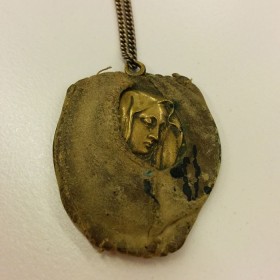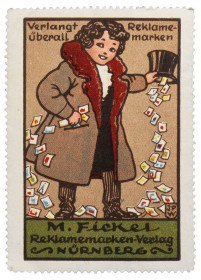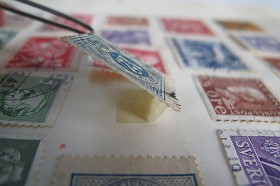An extraordinary gift

Medallion with the image of a saint © Jewish Museum Berlin, photo: Jörg Waßmer, gift of Fred Kranz
Last week, museum benefactor Fred Kranz accepted our invitation to participate in two workshops in our archives. He met with two classes of schoolchildren, one from Döbeln in Saxony and the other from Berlin’s Tegel district. It was the fifth time in recent years that Mr. Kranz – who was born in Berlin in 1938 – came back from the USA to speak to students and their parents about his life. The Kranz family, which consisted of Fred and his parents, survived the war living on a farm that belonged to a former employee of his father, in the village of Kallinchen on Motzener See (Lake Motzen) in Brandenburg.
In 2004, Fred Kranz donated a collection of documents and photographs to the museum that provide an impressive record of Jewish life in the years immediately following the war. During his most recent visit, he gave us a very special – a truly unique – object. Here is the story of this piece, in his words: → continue reading
“Poster stamps?” A short pause, a puzzled look. “And… what are poster stamps?” This was more or less the reaction of every one of my friends and acquaintances when I told them these last months about ‘what I’m working on at the museum right now’. Namely, an exhibition on poster stamps.

Poster stamp from the publisher M. Fickel © Jewish Museum Berlin, photo: Jens Ziehe, gift of Peter-Hannes Lehmann
Poster stamps, I would answer, are small promotional pictures, a little bigger than stamps. They were used as advertisements for products and stores just about exactly a hundred years ago. Some of the stamps were designed by well-known artists like Lucian Bernhard and people would collect them, particularly children.
I didn’t know much more than that about these poster stamps before I started researching for our cabinet exhibition “Pictures Galore and Collecting Mania – Advertising in Miniature”. The show begins on 4. December, 2014 and lasts until 31. May, 2015 at the Rafael Roth Learning Center. To learn more about the relevance that the stamps had before World War I, I began reading contemporary advertising manuals and magazines.
At first I found relatively little on the subject, → continue reading

A stamp with a loose paper hinge © Jewish Museum Berlin. Donated by Kurt W. Roberg, photo: Kirsten Meyer
Kurt Roberg (*1924) made a bequest to the Jewish Museum Berlin this year, which comprised among other things a stamp-album—one of the very few items in Roberg’s possession when he fled Berlin for Lisbon then New York in May 1941. Jewish emigrés were forbidden to take their belongings with them out of Germany so Roberg came to see the album as a symbol of his personal triumph over the National Socialist dictatorship.
It is a simple folder containing → continue reading


